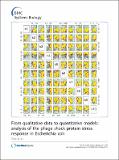From qualitative data to quantitative models: analysis of the phage shock protein stress response in Escherichia coli
Author(s)
Toni, Tina; Jovanovic, Goran; Huvet, Maxime; Buck, Martin; Stumpf, Michael P. H.
DownloadToni-2011-From qualitative data to quantitative models.pdf (4.580Mb)
PUBLISHER_CC
Publisher with Creative Commons License
Creative Commons Attribution
Terms of use
Metadata
Show full item recordAbstract
Background
Bacteria have evolved a rich set of mechanisms for sensing and adapting to adverse conditions in their environment. These are crucial for their survival, which requires them to react to extracellular stresses such as heat shock, ethanol treatment or phage infection. Here we focus on studying the phage shock protein (Psp) stress response in Escherichia coli induced by a phage infection or other damage to the bacterial membrane. This system has not yet been theoretically modelled or analysed in silico.
Results
We develop a model of the Psp response system, and illustrate how such models can be constructed and analyzed in light of available sparse and qualitative information in order to generate novel biological hypotheses about their dynamical behaviour. We analyze this model using tools from Petri-net theory and study its dynamical range that is consistent with currently available knowledge by conditioning model parameters on the available data in an approximate Bayesian computation (ABC) framework. Within this ABC approach we analyze stochastic and deterministic dynamics. This analysis allows us to identify different types of behaviour and these mechanistic insights can in turn be used to design new, more detailed and time-resolved experiments.
Conclusions
We have developed the first mechanistic model of the Psp response in E. coli. This model allows us to predict the possible qualitative stochastic and deterministic dynamic behaviours of key molecular players in the stress response. Our inferential approach can be applied to stress response and signalling systems more generally: in the ABC framework we can condition mathematical models on qualitative data in order to delimit e.g. parameter ranges or the qualitative system dynamics in light of available end-point or qualitative information.
Date issued
2011-05Department
Massachusetts Institute of Technology. Department of Biological EngineeringJournal
BMC Systems Biology
Publisher
BioMed Central Ltd.
Citation
Toni, Tina et al. “From qualitative data to quantitative models: analysis of the phage shock protein stress response in Escherichia coli.” BMC Systems Biology 5 (2011): 69.
Version: Final published version
ISSN
1752-0509